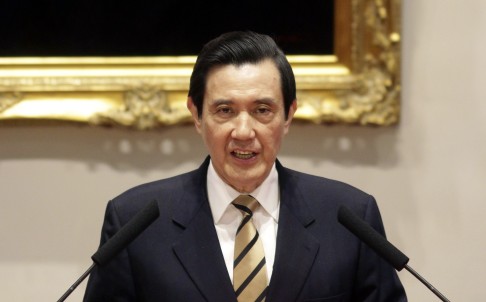Taiwan president sues radio host for defamation over food safety scandal remarks
Presenter alleged that Ma Ying-jeou had accepted political donations from a company embroiled in food safety scandals on the island
PUBLISHED : Tuesday, 30 December, 2014, 3:44pm
UPDATED : Tuesday, 30 December, 2014, 3:46pm
Agence France-Presse in Taipei

President Ma has also filed a criminal case for aggravated defamation that could result in a jail term for the radio host, if convicted. Photo: Reuters
The President of Taiwan, Ma Ying-jeou, on Tuesday filed defamation lawsuits against a radio host for alleging that he accepted illicit political donations from a company implicated in food safety scandals.
Ma is seeking compensation of NT$10 million (HK$2.4 million) and printed apologies in four major newspapers from Clara Chou in a civil defamation suit, his lawyer Hung Wen-jun told reporters outside Taipei district court.
He also filed a criminal aggravated defamation suit against Chou since she “continues to make the same remarks concerning the case even though relevant persons have made many clarifications or even filed lawsuits against her”, Hung said.
Chou accused Ma of accepting under-the-table funds totalling NT$200 million to act as the “guardian” of food giant Ting Hsin, which has faced widespread public outrage and an island-wide boycott of its products following several food safety scandals.
Ma firmly rejected the allegation, saying his government has fully investigated the company’s alleged involvement in the scandals and indicted 57 people so far.
Chou could face a maximum two-year jail term if convicted of aggravated defamation.
The governing Kuomintang party and a businessman have also filed lawsuits against Chou this month over her allegations.
Ting Hsin, which owns the instant noodle brand Master Kong that is popular in Taiwan and mainland China, has been implicated in three food safety scandals since late last year.
In the latest case that surfaced in October its subsidiary Ting Hsin Oil was accused of selling oil intended for animal food, which is banned for human use, as regular lard and cooking oil.
That claim led to hundreds of tonnes of products being pulled from shop shelves.
